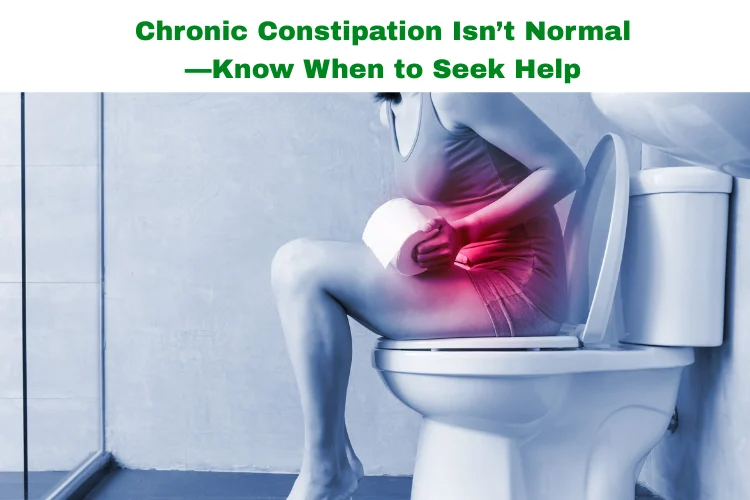Constipation is a common occurrence for everyone, but when it persists, it becomes more than just discomfort. Constant constipation can cause problems in your life and be an indication of more serious health problems. While sporadic digestive issues are common, persistent symptoms need to be addressed.
What is Chronic Constipation?
Chronic constipation is defined as infrequent or difficult bowel movements that persist for several weeks or longer. It’s more than just the occasional skipped day—it’s a pattern that can interfere with your quality of life.
You may be experiencing chronic constipation if you:
- Have fewer than three bowel movements a week
- Strain excessively during bowel movements
- Pass hard or lumpy stools
- Feel like you can’t completely empty your bowels
- Rely frequently on laxatives
Common Causes of Chronic Constipation
1. Low-Fiber Diet
A diet lacking in fiber-rich foods like fruits, vegetables, and whole grains is a top contributor. Fiber adds bulk to stool and helps it move smoothly through the digestive system.
2. Dehydration
When your body lacks water, the colon absorbs more fluid from stool, making it hard and difficult to pass.
3. Sedentary Lifestyle
Physical inactivity can slow down digestion. People who are inactive or bedridden often suffer from constipation.
4. Ignoring the Need to Go
Keeping bowel movements delayed when there’s an urge to go can eventually cause tougher stools and more fragile signals from your body.
5. Some Medications
Medications that painkillers, antidepressants, and medications used to treat high blood pressure lead to as a side effect.
6. Certain Medical Conditions
Diabetes, hypothyroidism, irritable bowel syndrome (IBS), and neurologic conditions also have a say.
What Causes Chronic Constipation? Common Reasons & Solutions
Warning Signs to Watch For
Although chronic constipation itself is not always harmful, it may be a sign of something more serious. See a doctor if you experience:
- Blood in stool
- Unexplained weight loss
- Severe pain in the abdomen
- Constipation for over three weeks
- Sudden change in bowel habits without an apparent cause
These may be signs of underlying conditions such as colorectal cancer, bowel obstruction, or nerve disorders.
Complications of Chronic Constipation
Ignoring chronic constipation may result in:
- Hemorrhoids: Straining increases pressure on veins around the anus.
- Anal fissures: Hard stool can lead to small anal lining tears.
- Fecal impaction: Stool hardens and becomes wedged, sometimes needing medical removal.
- Rectal prolapse: Part of the rectum can be pushed out through the anus by straining.
Tips for Managing Chronic Constipation
1. Eat More Fiber
Include 25–30 grams of fiber per day from whole grains, vegetables, legumes, and fruits.
2. Stay Hydrated
Aim to drink 8 to 10 glasses of water daily. Hydration helps soften stool.
3. Move Your Body
Exercise stimulates bowel function. Even a daily walk can help promote regularity.
4. Create a Routine
Attempt to go to the bathroom at the same hour every day—ideally after meals.
5. Don’t Suppress the Urge
Going along with your body’s natural cues can prevent buildup and hardening of stools.
6. Use Laxatives Judiciously
Over-the-counter laxatives can give relief temporarily, but excessive use can render the bowel less sensitive. Consult your doctor before prolonged use.
When to See a Doctor
If lifestyle changes don’t work or symptoms get worse, it’s time to talk to a healthcare provider. A medical evaluation can exclude serious causes and determine the proper treatment.
You may require diagnostic tests such as:
- Blood tests
- Colonoscopy
- Imaging tests
Early treatment stops complications and brings lasting relief.
Chronic Constipation : When to See a Doctor?
FAQs About Chronic Constipation
1. How is chronic constipation different from occasional constipation?
Chronic constipation occurs regularly for several weeks or more, while occasional constipation is short-lived.
2. Can chronic constipation be a sign of cancer?
In rare cases, yes. Persistent symptoms should be evaluated to rule out serious conditions.
3. Is coffee good or bad for constipation?
For some people, coffee can stimulate bowel movements. However, it may cause dehydration if overused.
4. Are fiber supplements helpful?
Yes, they can be effective, especially if dietary fiber is insufficient. Choose psyllium-based options.
5. What role does stress play in constipation?
Stress can disrupt gut-brain communication, slowing digestion and contributing to constipation.
6. Should children with chronic constipation be treated differently?
Yes, pediatric constipation requires age-appropriate care and dietary adjustments under medical supervision.
Conclusion
Chronic constipation is more than a stomach nuisance—it can be a warning sign. By learning what causes it and when to get help, you can take charge of your digestive health and prevent long-term problems.
Suffering from chronic constipation? Schedule a medical consultation today for a custom treatment plan.




